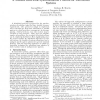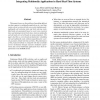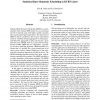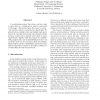117
click to vote
SAC
2008
ACM
15 years 1 months ago
2008
ACM
Energy-efficiency has been an important system issue in hardware and software designs to extend operation duration or cut power bills. This research explores systems with probabil...
180
click to vote
RTSS
1995
IEEE
15 years 5 months ago
1995
IEEE
A distributed protocol is proposed for the synchronization of real-time tasks that have variable resource requirements. The protocol is simple to implement and is intended for lar...
117
click to vote
RTSS
1995
IEEE
15 years 5 months ago
1995
IEEE
We present a scheme to guarantee that the execution of real-time tasks can tolerate transient and intermittent faults assuming any queue- based scheduling technique. The scheme is...
127
click to vote
RTSS
1998
IEEE
15 years 6 months ago
1998
IEEE
This paper focuses on the problem of providing efficient run-time support to multimedia applications in a real-time system, where two types of tasks can coexist simultaneously: mu...
128
click to vote
ICECCS
1998
IEEE
15 years 6 months ago
1998
IEEE
The main focus of this paper is the problem of ensuring timeliness in safety critical systems. First, we introduce a method and its associated technique to model both real-time ta...
117
click to vote
RTSS
1999
IEEE
15 years 6 months ago
1999
IEEE
Statistical Rate Monotonic Scheduling (SRMS) is a generalization of the classical RMS results of Liu and Layland [LL73] for periodic tasks with highly variable execution times and...
135
click to vote
RTCSA
1999
IEEE
15 years 6 months ago
1999
IEEE
A non-blocking protocol that allows real-time tasks to share data in a multiprocessor system is presented in this paper. The protocol gives the means to concurrent real-time tasks...
116
click to vote
RTCSA
2006
IEEE
15 years 8 months ago
2006
IEEE
From a real-time perspective, the Garbage Collector (GC) introduces unpredictable pauses that are not tolerated by real-time tasks. Real-time collectors eliminate this problem but...
118
click to vote
RTCSA
2008
IEEE
15 years 8 months ago
2008
IEEE
Energy-efficient real-time task scheduling has been actively explored in the past decade. Different from the past work, this paper considers schedulability conditions for stochas...
107
click to vote
ETFA
2008
IEEE
15 years 8 months ago
2008
IEEE
The distribution of real-time tasks in a networked environment in principle has several advantages, above all a high degree of flexibility easing system extension and replacement...




